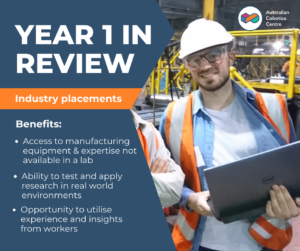POSTED: 12 Sep, 2022
Continuing our celebration of 1 year in operation, today we are looking at one of the key elements of the Centre – the 12 month industry placement that our postdocs and PhD researchers are required to completed during their time with the Centre.
 Industry placements for our researchers are critical for the success of the Centre. Our aim is to transform Australian Manufacturing through the implementation of cobotics and, to do this, we need to understand the physical environment and constraints that our industry partners have, in order to co-design solutions that meet their needs.
Industry placements for our researchers are critical for the success of the Centre. Our aim is to transform Australian Manufacturing through the implementation of cobotics and, to do this, we need to understand the physical environment and constraints that our industry partners have, in order to co-design solutions that meet their needs.
All of our PhD and Postdoctoral Research Fellows will complete a total of 12 months at our industry partners over their time with the Centre. To maximise the experience and gain exposure to many different manufacturing operations and ways of working, our researchers will complete the placement across multiple industry partners and at various points throughout their time with the Centre.
Our postdoctoral researcher, Fred Sukkar, from the Biomimic Cobots program, has been a regular visitor to our Industry partner, InfraBuild, since he started with the Centre in February. We asked Fred to share some details about what he’s being doing and how he’s benefitted from working on-site at InfraBuild.
1. What are the benefits of having an industry partner linked to your research?
Having an industry partner to collaborate with is beneficial because it provides the opportunity to work on interesting research problems while having a tangible real world application of that research. For me its a great way to apply and build on my current research which focuses on giving Cobots the intelligence to carry out valuable and practical work through clever algorithms that take inspiration from the way humans carry out jobs. Another great benefit is having access to resources, such as experts in the field and a manufacturing plant test bed, that you don’t usually get in the lab.
2. What have you learnt by working with and visiting Infrabuild?
I have learnt a lot about the steel bar manufacturing process by seeing it in person at the steel mill at Rooty Hill, NSW and chatting with various workers there. I’ll be sitting inside the control room coding or looking at sensor data and workers will regularly rotate in and out. Everyone is always interested in what I’m doing and keen to give me a run down of how everything works. I have even got a lot of valuable insights and advice on how to solve the problem. The workers have a lot of first hand experience and understand different aspects of the system better than we do, so leveraging that has been invaluable.
3. How do you approach working with different roles in the company?
Communication is the most important factor to consider when approaching people in different roles. Determining what is the necessary information to convey and conveying it in an easy to understand way is challenging but absolutely necessary in order to not overwhelm people and ensure everyone is on the same page. I found this to be really important during the project with Infrabuild because you interact with so many different people with varying backgrounds and technical skills. I have also found it necessary to constantly adapt over the project depending on the outcomes or, for example, due to people becoming more familiar with the project.
Recent News
Meet our E.P.I.C. Researcher, Zongyuan Zhang
Zongyuan Zhang is a PhD Researcher in the Biomimic Program and is currently researching the following problem: how to use robots with a non-rigidly ...
Exploring the Realities of Cobot Adoption in Manufacturing
We’re proud to celebrate the latest publication from our research team in Futures, a leading journal by Science Direct. Congratulations to PhD resea ...
Australian Cobotics Centre Researchers Present at AOA QORF 2025 Meeting
Last week, researchers from the Australian Cobotics Centre were proud to present their work at the Australian Orthopaedic Association (AOA) Queensland ...